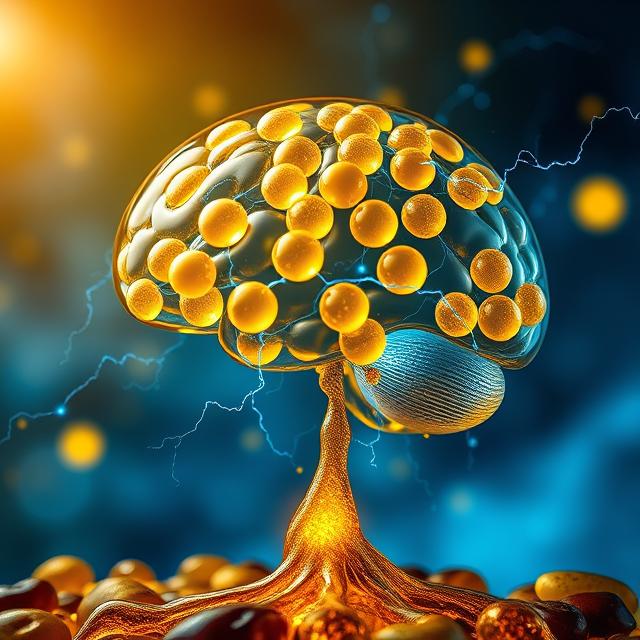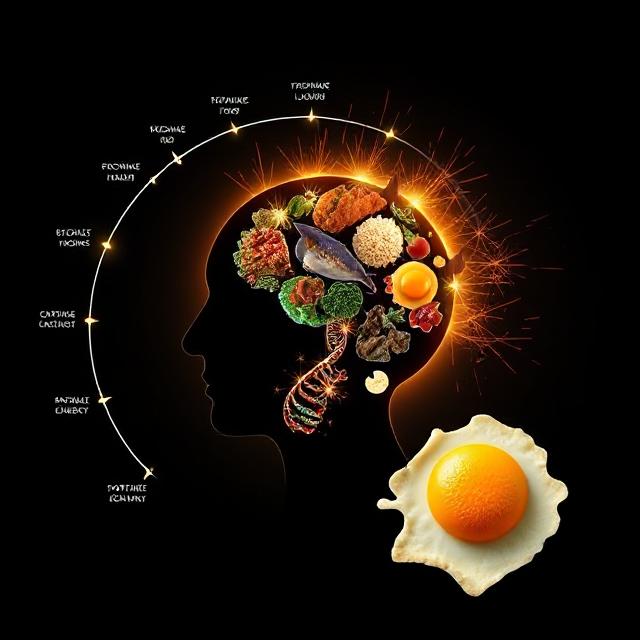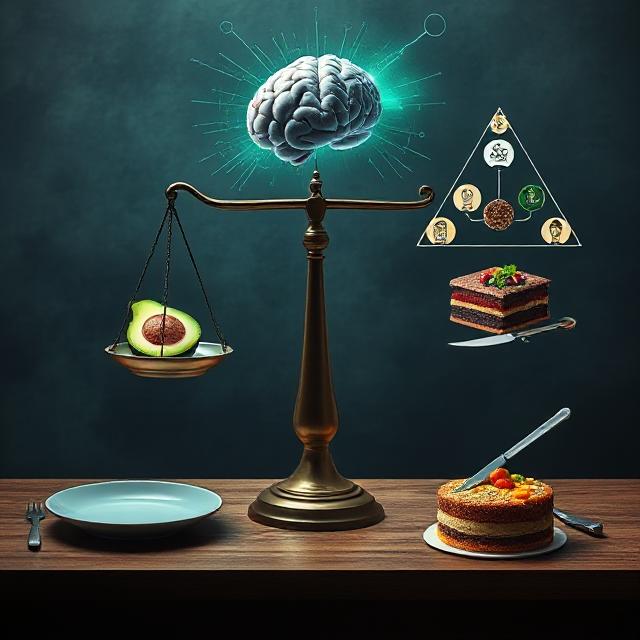Table of Contents
Macronutrient Function: Fat, Protein & Carbohydrates in Brain & Body Health
Your body and brain rely on three main macronutrients to thrive: fat, protein, and carbohydrates.
Each plays a unique, indispensable role in supplying energy, repairing tissues, and maintaining cognitive functions.
Far beyond simple calorie sources, these macronutrients orchestrate your metabolism and brain chemistry, shaping how you think, move, and feel.
Understanding their distinct functions and how they interact is key to mastering your nutrition and optimizing your mental and physical performance.
1. Fat: The Brain’s Rich Fuel and Structural Backbone
The Energy Powerhouse
- Fat supplies 9 calories per gram—more than twice the energy density of carbs or protein.
- The brain relies heavily on fat-derived molecules, especially during fasting or low-carb states when ketone bodies replace glucose as a primary fuel.
Structural Importance
- Fat is the main component of the myelin sheath, the insulating layer around neurons that speeds electrical impulses.
- Fatty acids, especially omega-3s (DHA and EPA), are crucial for neuronal membrane fluidity, synaptic plasticity, and anti-inflammatory processes.
Fat Types & Brain Health
- Saturated fats in moderation support hormone production and cellular membranes.
- Monounsaturated fats (olive oil, avocado) aid cardiovascular and cognitive health.
- Polyunsaturated fats, particularly omega-3s from fish or algae, are linked to improved memory and mood regulation.
Metabolic Role
- Fat undergoes beta-oxidation in mitochondria to generate ATP—the energy currency for all brain and body functions.
- In the liver, fats convert to ketones (acetoacetate, beta-hydroxybutyrate) that can cross the blood-brain barrier and fuel neurons efficiently.
2. Protein: The Brain’s Molecular Toolkit
Building Blocks of Life
- Protein provides amino acids, the foundation for all enzymes, neurotransmitters, and structural proteins.
- Unlike fat and carbs, protein is rarely a primary energy source but critical for repair, growth, and signaling.
Neurotransmitter Precursors
- Amino acids like tryptophan and tyrosine convert into serotonin and dopamine—key neurotransmitters for mood, motivation, and cognition.
- Glutamate and GABA, the main excitatory and inhibitory neurotransmitters, also derive from amino acids.
Brain Plasticity and Repair
- Protein supports synaptic remodeling, learning, and memory by supplying necessary substrates for neuron and glial cell regeneration.
- Brain-derived neurotrophic factor (BDNF), essential for neuroplasticity, requires adequate protein intake.
Protein and Satiety
- Protein’s role in stimulating peptide hormones (e.g., GLP-1, CCK) helps regulate appetite, reduce cravings, and balance blood sugar—supporting cognitive clarity.
3. Carbohydrates: The Quick Energy & Metabolic Signal
Primary Brain Fuel
- Glucose, derived from carbohydrates, is the preferred fuel of the brain under normal conditions.
- The brain consumes nearly 120 grams of glucose daily, supporting continuous synaptic activity and signaling.
Types of Carbohydrates
- Simple carbs (sugars) provide quick bursts of energy but can lead to rapid blood sugar spikes and crashes, affecting focus and mood.
- Complex carbs (fiber-rich vegetables, whole grains) provide sustained glucose release, stabilizing energy and supporting gut-brain health.
Role in Neurotransmitter Synthesis
- Glucose metabolism generates precursors for acetylcholine, a neurotransmitter vital for memory and attention.
- Carbohydrate intake influences insulin release, which modulates amino acid transport into the brain, indirectly affecting neurotransmitter balance.
Gut-Brain Axis
- Fermentation of fiber by gut microbes produces short-chain fatty acids (SCFAs) that influence brain function and inflammation.
- Balanced carb intake supports a healthy microbiome, which communicates bi-directionally with the brain.
4. Balancing Macronutrients for Optimal Brain Function
Metabolic Flexibility
- The ability to switch efficiently between glucose and fat metabolism enhances resilience and cognitive stability.
- Diets like ketogenic or low-carb high-fat (LCHF) promote ketone production for enhanced mitochondrial efficiency and neuroprotection.
- Conversely, balanced diets with sufficient complex carbs fuel rapid cognitive demands and physical endurance.
Protein Timing and Quality
- Regular intake of complete proteins (containing all essential amino acids) supports ongoing neurotransmitter synthesis and brain repair.
- Plant and animal sources vary in bioavailability; combining legumes, grains, nuts, and animal proteins ensures optimal amino acid profiles.
Individual Variation
- Genetic, epigenetic, and lifestyle factors influence macronutrient needs.
- Some people thrive on higher fats; others need more carbs for mental performance.
- Experimenting with macronutrient ratios while monitoring cognitive and physical outcomes is key.
5. Practical Tips to Harness Macronutrients for Mental Energy
- Include omega-3 rich fats daily via fatty fish, flaxseed, or supplements to support brain structure and reduce inflammation.
- Consume high-quality protein (eggs, poultry, legumes) with every meal to maintain neurotransmitter balance.
- Prioritize complex carbohydrates (sweet potatoes, quinoa, vegetables) for sustained glucose without energy crashes.
- Avoid excessive processed sugars and trans fats which impair brain function and increase oxidative stress.
- Practice metabolic cycling: alternate periods of higher carb intake with fat-focused fasting phases to boost mitochondrial health and cognitive sharpness.
6. Common Myths and Misconceptions
Myth: Fat Makes You Fat and Damages the Brain
- Truth: Healthy fats are vital for brain function and hormone regulation; excess carbs and sugar are more commonly linked to metabolic dysfunction.
Myth: Protein is Only for Muscle Building
- Truth: Protein fuels your brain’s chemical factory and repairs neural tissue continuously.
Myth: Carbs Are Bad for Cognitive Health
- Truth: Complex carbs are essential for sustained brain energy and mood balance.
7. Scientific Research Highlights
- Fatty acid supplementation improves cognitive function in aging and mood disorders (Frontiers in Neuroscience, 2021).
- Amino acid metabolism is tightly linked to neurotransmitter synthesis and mental health outcomes (Neurochemistry International, 2020).
- Carbohydrate quality and timing affect cognitive performance and brain plasticity (Nutrients Journal, 2022).
- Metabolic flexibility correlates with improved memory and resilience under stress (Journal of Clinical Investigation, 2019).
Conclusion: Macronutrients as Your Cognitive Allies
Understanding the function and balance of fat, protein, and carbohydrates empowers you to tailor your nutrition for peak brain and body health.
Each macronutrient plays an indispensable role—from the structural integrity of neurons, the speed of neurotransmission, to the metabolic fuel that powers every thought and movement.
Master your macronutrients—and unlock sustained mental clarity, resilience, and vitality.




